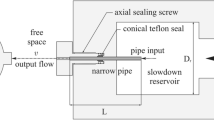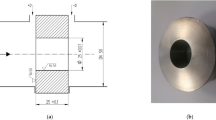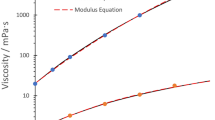Abstract
IN experiments on the flow of water in a long copper tubing, it was found that the inlet pressure must be maintained free from disturbances to the highest degree possible if flow in the critical region is to be analysed. When extraneous disturbances were eliminated, the flow in the tube falling between Reynolds' numbers 1,000 and 5,000 was found to fall into three distinct classes, all of which were different from both the viscous and the turbulent regimes. Strictly speaking, only the regime existing between 2,200 and 2,500 Reynolds' numbers in the present system showed the ordinarily accepted criteria of critical flow. Nevertheless, as both the regions between 1,000 and 2,200 and between 2,500 and 5,000 fall outside the laws of either viscous or turbulent regimes, they are treated here as 'pre-critical' and 'post-critical' regimes.
This is a preview of subscription content, access via your institution
Access options
Subscribe to this journal
Receive 51 print issues and online access
$199.00 per year
only $3.90 per issue
Buy this article
- Purchase on Springer Link
- Instant access to full article PDF
Prices may be subject to local taxes which are calculated during checkout
Similar content being viewed by others
References
Nissan, A. H., NATURE, 148, 503 (1941).
Author information
Authors and Affiliations
Rights and permissions
About this article
Cite this article
NISSAN, A. Flow of Liquids in the Critical Region. Nature 149, 501–502 (1942). https://doi.org/10.1038/149501b0
Issue Date:
DOI: https://doi.org/10.1038/149501b0
Comments
By submitting a comment you agree to abide by our Terms and Community Guidelines. If you find something abusive or that does not comply with our terms or guidelines please flag it as inappropriate.



